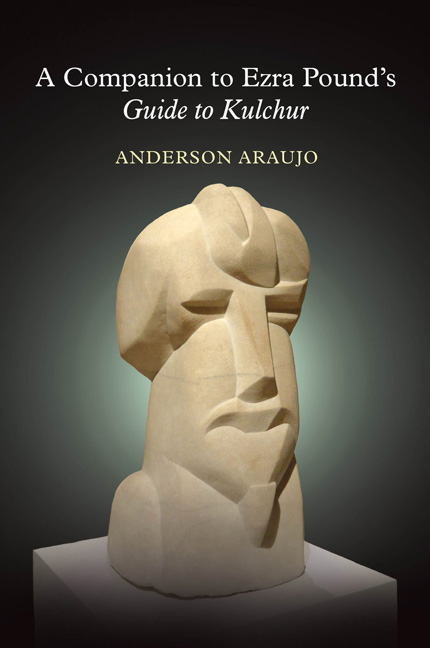Book contents
- Frontmatter
- Contents
- Acknowledgments
- Abbreviations
- Introduction
- Guide to Kulchur
- Frontispiece to Preface
- Part I
- Section I
- Section II
- Part II
- Section III
- Section IV
- Part III
- Section V
- Section VI
- Part IV
- Section VII
- Section VIII
- Section IV
- Part V
- Section X
- Section XI
- Part VI
- Section XII
- Section XIII
- Addenda: 1952
- Notes
- Index
Frontispiece to Preface
from Guide to Kulchur
- Frontmatter
- Contents
- Acknowledgments
- Abbreviations
- Introduction
- Guide to Kulchur
- Frontispiece to Preface
- Part I
- Section I
- Section II
- Part II
- Section III
- Section IV
- Part III
- Section V
- Section VI
- Part IV
- Section VII
- Section VIII
- Section IV
- Part V
- Section X
- Section XI
- Part VI
- Section XII
- Section XIII
- Addenda: 1952
- Notes
- Index
Summary
This wafer of wax … from the young Salustio Malatesta: Sallustio de’ Malatesta (1448–70), the only legitimate son and heir of Sigismundo Malatesta (1417–68), the legendary Italian Renaissance condottiere (warlord) of Rimini from 1429 to 1468, and his celebrated mistress and eventual third wife, Isotta degli Atti (1432–74). Sallustio was allegedly murdered by his half brother, Roberto Malatesta (1442–82). Pound's fascination with the epistolary seal reproduced in the frontispiece stems in no small measure from his tour of libraries and historical archives in Italy from February 11 to April 14, 1923. His nine-week research excursion took him to several cities, including Venice, Milan, Rome, Bologna, Florence, Rimini, and Modena, where he came across the Sallustio seal at Modena's Archivio di Stato. Pound commissioned the photograph of the seal reproduced in GK from a studio in Modena. Hugh Kenner cites this passage to illustrate the “vortex of architecture and sculpture” that the Malatesti created in Rimini, noting further that “Pound owned a seal made by Edmund Dulac” (1882–1953), a French illustrator and stamp designer. Pound further underscores the seal's importance in the chapter “Examples of Civilization” (GK 159).
There are three direct references to Sallustio in The Cantos, the first in Canto 9, where his tutor reports in a letter dated December 30, 1454 that his infant pupil “is so much pleased with his pony,” and in Cantos 20 and 74, both of which mention the young lord alongside his mother (9/38, 20/94, 74/468). Canto 74 specifically cites the pseudo-Pisanello “intaglios” (seals) of Sallustio “in the time of Ixotta,” his mother.
Pisanello medals: Antonio Pisano (Pisanello) (c.1394–1455), Veronese courtly painter and medalist, who pioneered portrait medals made to commemorate special events. For Pound, the Pisanello medal marked an index of high civilization in early Renaissance Italy. In Canto 74, Pound cites Pisanello and his Veronese compatriot, Matteo da Pasti (1420–68), who also made medallions of Sigismundo and Isotta:
for praise of intaglios
Matteo and Pisanello out of Babylon
they are left us
for roll or plain impact
or cut square in the jade block (74/457)
- Type
- Chapter
- Information
- A Companion to Ezra Pound's Guide to KulcherGuide to Kulcher, pp. 20 - 28Publisher: Liverpool University PressPrint publication year: 2018



